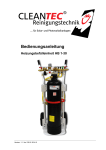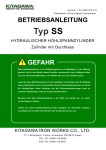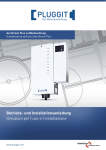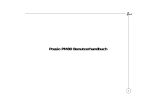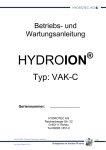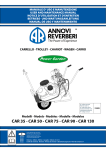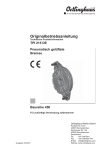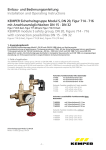Download Einbau- und Bedienungsanleitung Installation and Operation Manual
Transcript
Einbau- und Bedienungsanleitung Installation and Operation Manual KEMPER Filter Modul F KEMPER Module F Filter Figur 712, DN 15 – DN 50 Figure 712, DN 15 – DN 50 KEMPER Druckminderer-Filter-Kombination Modul DMF KEMPER Module DMF pressure reducing valve-Filter combination Figur 713, DN 15 – DN 50 Figure 713, DN 15 – DN 50 mit KEMPER Basis-Modul with KEMPER Basic Module Figur 700, DN 15 – DN 50 Figure 700, DN 15 – DN 50 Allgemeine Sicherheitshinweise 1. Benutzen Sie den Druckminderer nur: - bestimmungsgemäß - in einwandfreiem Zustand - sicherheits- und gefahrenbewusst. 2. Die Einbauanleitung ist zu beachten. 3. Zur sachgemäßen Verwendung ist sicherzustellen, dass die Druckminderer nur dort zum Einsatz kommen, wo Betriebsdruck und Temperatur die bei der Bestellung zugrunde gelegten Auslegungskriterien nicht überschreiten. Für Schäden, die durch äußere Kräfte oder andere äußere Einwirkungen entstehen, ist der Hersteller nicht verantwortlich! Gefährdungen, die am Druckminderer vom Durchflussmedium und dem Betriebsdruck ausgehen können, sind durch geeignete Maßnahmen zu verhindern. 4. Alle Montagearbeiten sind durch autorisiertes Fachpersonal durchzuführen. General Notes of Safety 1. Only use the pressure reducer: - for the specified purpose - in satisfactory condition - with respect for safety and potential hazards. 2. Always observe the installation instructions. 3. To ensure correct use always make sure to only install the pressure reducer in places where the operating pressure and temperature do not exceed the design criteria on which the order is based. The manufacturer shall not be responsible for damage caused by outside forces or other external influences! Hazards at the pressure reducer caused by the flow medium and operating pressure are to be avoided through appropriate measures. 4. All assembly work is to be carried out by authorized specialist staff. HINWEIS Wir empfehlen die Neuinstallation und Durchführung der Wartungsarbeiten durch einen autorisierten Fachbetrieb. Um eine Verkeimung zu verhindern, sollte die Wartung und der Austausch von Innenteilen der Armatur nur mit desinfizierten Einweghandschuhen vorgenommen werden. Diese sind im Lieferprogramm der Ersatzteile enthalten. NOTE It is recommended to have a new installation and maintenance work carried out by an authorized expert workshop. In order to avoid bacterial contamination, the maintenance and replacement of the valve inner parts should only be carried out wearing disinfected disposable gloves. Those gloves are available within the delivery program of spare parts. -1- KEMPER Filter Modul F KEMPER Module F Filter Filter Modul F Figur 712 Module F Filter Figur 712 als Funktions-Modul Größe I as Function-Module size I als Funktions-Modul Größe II as Function-Module size II Basis-Modul Figure 700 G Basic Module Figure 700 G für Basis-Modul DN 15 bis DN 25 (32) oder for Basic-Module DN 15 to DN 25 (32) or für Basis-Modul DN 32 bis DN 50 for Basic-Module DN 32 to DN 50 1. Anwendungsbereich Der rückspülbare Filter Modul F ist nach DIN EN 13443-T1 (ehemals DIN 19632) geprüft und wurde für den Einsatz als Filter-Armatur für Trinkwasserinstallationen nach DIN 1988 konstruiert. Die lt. DIN 1988 regelmäßig vorzunehmende Rückspülung wird bei Zusetzen des Filters (z. B. durch Schwebteilchen oder Rückstände im Wasser) durch eine differenzdruckgesteuerte Rückspülanzeige signalisiert. Der Einbau des Filter Modul F in die Rohrleitung erfolgt zusammen mit dem KEMPER Basis-Modul Figur 700. Er kann bei Bedarf optional zur Druckminderer-Filter-Kombination Modul DMF nachgerüstet werden, indem anstelle der werkseitig montierten Überströmkappe ein Druckminderer-Modul Figur 710 montiert wird. Aus hygiene- und funktionstechnischer Sicht ist der Filter nicht im Bereich Eigenwasserversorgungsanlagen einzusetzen. 1. Scope of use The back-flush filter Module F is tested according to DIN EN 13443-T1 (before19632) and it has been designed for use as a filter valve for drinking water installations according to DIN 1988. The back-flushing to be carried out regularly according to DIN 1988 is at filter clogging (e. g. through floating particles or rests in water) signalled by means of pressure difference controlled back-flush indicator. The Module F filter is mounted into a piping system together with the KEMPER Basic Module Figure 700. In case of need it can be optionally added to the Module DMF pressure reducing valve-filter combination, so that instead of the overflow cap mounted at works the pressure reducing valve module Figure 710 is added. For hygienic and functional-technical reasons the filter cannot be used at self-managed water supply equipment. 2. Montage siehe hierzu die Explosionszeichnung unter Punkt 8 Der Filter Modul F Figur 712 wird mit dem Basis-Modul Figur 700 (Position B) verbunden und spannungsfrei bei Beachtung der auf dem Basis-Modul gekennzeichneten Fließrichtung in die Rohrleitung eingebaut. Um einen einwandfreien und bestimmungsgemäßen Betrieb zu gewährleisten, muss der Einbau des Filters in allen Fällen senkrecht mit dem Auslauf nach unten erfolgen. Der nach DIN EN 1717 konstruierte Auslauf des Filters ist bei Vorhandensein einer Abwasserleitung an die Kanalisation anzuschließen. Empfehlenswert ist die Installation eines Bodenablaufes im Bereich des Filters, um ein automatisches Ablaufen des bei der Rückspülung anfallenden Wassers zu gewährleisten. Vor der Inbetriebnahme des Filters ist die Leitung vor dem Filter ausreichend zu spülen. 2. Mounting see the isometric exploded assembly under 8 -2- The Filter Module F Figure 712 is to be connected with the Basic Module Figure 700 (Position B) and stress-free mounted into the piping. Attention has to be paid to the flow direction marked on the basic module. In order to guarantee a problem-free, purposeful operation, the filter has to be mounted vertically in all cases, with the outlet pointing downwards. The filter outlet designed according to DIN EN 1717 is to be connected to sewerage if waste-water piping is available. Installation of a floor inlet within the range of the filter is recommended in order to assure automatic flowing-off of the water arisen at back-flushing. The pipe has to be flushed before the commissioning of the filter. 3. Ausführung und Technische Daten 3. Design and Technical Data 3.1 Ausführung 3.1 Design KEMPER Rückspülfilter nach DIN EN 13443- T1 KEMPER back-flush filter according to DIN EN 13443-T1 Filtereinsatz: Filter sleeve: Trennschärfe: Filter efficiency Materialeigenschaften Filtertasse: Filter plate material properties: Kunststoffteile: Plastic parts: Mediumberührte Innenteile: Inner parts being in contact with drinking water: Rotgusskomponenten: Components of gunmetal: ABP-Nr:. ABP No. als manueller Rückspülfilter as a manual back-flush filter aus nichtrostenden Stahlgewebesegmenten made of stainless steel wire fabric segments 72% 72% stoßfest, glasfaserverstärkter Kunststoff impact resistant, glass fibre reinforced plastic aus schlagfestem Thermoplast made of impact resistant thermoplastic aus Rotguss, Edelstahl und hochwertigem Kunststoff made of gunmetal, stainless steel and high-quality plastic entsprechend DIN 50930-6 according to DIN 50930-6 P-IX: 7938/I (DN 15-25), 6732/I (DN 32) P-IX: 7938/I (DN 15-25), 6732/I (DN 32) 3.2 Maße 3.2 Dimensions Nennweite Nominal inside diameter Bauhöhe (H1) built-in height (H1) Bauhöhe (H2) built-in height (H2) Bautiefe (T1) built-in depth (T1) Bautiefe (T2) built-in depth (T2) Baulänge (L1) built-in length (L1) Ablauf-Durchmesser (D) outflow diameter (D) Gewicht weight DN 32 40 50 mm 15 - 25 (32) 324 471 471 471 mm 276 384 384 384 mm 114 142 142 142 mm 53 67,5 67,5 67,5 mm 105 145 145 145 mm 50 50 50 50 kg 3,0 4,8 4,8 4,8 3.3 Hydraulische Daten: Durchfluss bei Δp = 0,2 bar, Δp = 1,0 bar 3.3 Hydraulic Data: Rate of flow at Δp = 0,2 bar, Δp = 1,0 bar DN 15 2,3 20 3,0 25 3,3 32 (Gr 1) 3,3 32 (Gr. 2) 6,8 40 7,5 50 9,0 Δp = 0,5 3,0 4,6 5,0 5,0 11,8 12,0 14,5 Q (m³/h) Δp = 1,0 Q (m³/h) 4,3 6,8 7,2 7,2 17,0 18,5 20,9 Δp = 0,2 Q (m³/h) -3- 3.4 Technische Eigenschaften 3.4 Technical data mediumberührte Innenteile aus Rotguss, Edelstahl und hochwertigem Kunststoff inside parts being in contact with drinking water made of gunmetal, stainless steel and high-quality plastic nach DIN EN 13443-1, ehemals DIN 19632 According to DIN EN 13443-1, once DIN 19632 DVGW-Zulassung: DN 15 – DN 20: NW9301BP5558, DN 32 – DN 50 DVGW registration: DN 15 – DN 20: NW9301BP5558, DN 32 – DN 50 Betriebstemperatur max. 30°C maximum operating temperature 30 °C Druckstufe (PN) 16 bar 16 bar rated pressure (PN) benötigter Mindest- Vordruck: 2 bar required minimum preset pressure: 2 bar Dichtungen und Kunststoffteile mit KTW- Zulassung KTW certificate for packing and plastic parts mit automatischer differenzdruckgesteuerter Anzeige bei Verschmutzung des Filters with automatic pressure difference controlled display at filter clogging Einbaulage: Hauptachse senkrecht mounting position: main axis vertical Durchlassweiten: untere 90 μm, obere 125 μm through-flow width values: lower 90 μm, upper 125 μm 4. Werkstoffe 4. Materials Zwischenflansch intermediate flange Filtergehäuse filter casing Segment-Filtereinsatz segment-filter sleeve Rückspülventil back-flush valve Überströmkappe overflow cap Befestigungsschrauben fixing screws Verschlussstopfen closing plug Ablauftrichter outflow funnel Dichtung packing 5. Optional erhältliches Zubehör 5. Optional Accessories Rotguss gunmetal PA PA Niro / POM stainless steel / POM Rotguss gunmetall PPA PPA Niro stainless steel Rotguss gunmetall POM POM NBR / EPDM NBR / EPDM Basis-Modul Basic module Manometer Manometer Überstromkappe Overflow cap Rückspulautomatik back-flushing automatic T 5100 700 00 B 3100 700 00 701 00 001 Bei Bedarf kann der Filter zur Anzeige des Systemdruckes optional mit einem Manometer ausgerüstet werden (Figur T510070000001). If necessary, the filter can be fitted optionally with a manometer (Figure T510070000001) to indicate the system pressure. Rückspülleistung der KEMPER Filter in Abhängigkeit des Vordruckes Vordruck bar 3 6 10 13 16 700 G Rückspülleistung l/s m³/h 1,05 3,78 1,39 5,00 1,74 6,25 1,94 6,97 2,13 7,65 -4- 6. Bedienung Bei einer Verschmutzung der Filtersegmente steigt die Druckdifferenz über dem Filter an, was zu einer spürbaren Verminderung der Durchflussleistung führt. Sichtbar wird die entstehende hohe Druckdifferenz durch das Hervortreten des roten Anzeigestiftes innerhalb des transparenten Fensters an der Rückspülanzeige (1). Der Filter ist entsprechend Punkt 7 Wartung rückzuspülen, um die zugesetzten Filterelemente wieder zu reinigen. Um die Rückspülzyklen automatisch einzuhalten kann der Filter mit einer Rückspülautomatik ausgerüstet werden. Diese ist für unterschiedliche Rückspülintervalle (7, 14, 30 Tage) voreinstellbar. Voraussetzung für die Funktion der Rückspülautomatik ist eine elektrische Stromversorgung (230 V AC) am Einbauort sowie ein fest installierter ausreichend dimensionierter Abwasseranschluss. 6. Operation When the filter segments become clogged the pressure difference over the filter increases, which results in a noticeable reduction of the rate of flow output. The high pressure difference arisen is visible by projecting the red indicating pin inside the transparent field on the back-flushing indicator (1). The filter has to be back-flushed according to point 7 Maintenance in order to clean the clogged filtering elements again. To hold the back-flushing cycles automatically the filter can be fitted with a back-flushing automatic. This is can be preset for different back-flushing intervals (7, 14,30 days). The premise for the function of the back-flushing automatic is an electric current supply (230 V AC) at the assembly area and a close installed, sufficiently dimensioned waste water connection. 7. Wartung Nach DIN EN 806-5 (DIN 1988-8, 12/1988) muss spätestens nach 2 Monaten eine Rückspülung, halbjährlich eine Inspektion sowie jährlich eine Wartung erfolgen. Die Intervallanzeige an der Differenzdruckanzeige soll an die nächste fällige Wartung in 2 Monaten erinnern, indem der Monat der letztmalig erfolgten Rückspülung eingestellt wird. Das bei der Rückspülung anfallende Rückspülwasser kann mittels eines Auffangbehälters oder durch den fest installierten Abwasseranschluss abgeführt werden. Zur Rückspülung ist der Betätigungsknopf (C) zu drücken (Kugelschreiberprinzip). Ist dieser herausgesprungen, kann durch 90° Rechts-Drehung am Betätigungsknopf (C) das Ablassventil geöffnet werden. Das Wasser läuft anschließend mit maximaler Rückspülmenge aus dem Auslauf aus. Für eine vollständige Rückspülung ist das Filterunterteil (D) nun zusätzlich nach rechts oder links mit zwei bis drei Umdrehungen um 360° zu drehen. Dabei bleibt das Ablassventil weiterhin voll geöffnet. Aus Gründen der Trinkwasserhygiene wird empfohlen, den Rückspülvorgang nicht zu verkürzen. Die Ablassmenge am Ablassventil sollte nicht reduziert werden, um bei voller Leistung entsprechend alle in den Filterelementen befindlichen Partikel auszuspülen! Anschließend ist das Ablassventil bei (C) wieder durch 90° Drehung links zu schließen und den Filter zum Rückstellen der roten Verschmutzungsanzeige drucklos zu schalten. Hierzu ist der Filter eingangsseitig abzusperren (z. B. an einer Absperrarmatur in Fließrichtung vor dem Filter) und am Ablassventil (C) kurz zu öffnen. Die rote Anzeige stellt sich so automatisch wieder zurück. Die eingangsseitige Absperreinrichtung kann wieder geöffnet und der Filter in Betrieb genommen werden. Eine einwandfreie Funktion ist jetzt wieder bis zur nächsten Rückspülung in 2 Monaten gewährleistet. Die Monatsanzeige ist auf den aktuellen Monat einzustellen. 7. Maintenance According to DIN EN 806-5 (DIN 1988-8, 12/1988) back flushing has to be carried out at the filter with intervals of 2 months at the latest, every 6 months an inspection and once a year a maintenance. The interval indicator on the pressure difference display should remind you of the next due maintenance in 2 months, if the month of the last carried out back-flushing is set. The water arisen at back-flushing can be drained away by means of a catch container or through a fixed waste water connection. To carry out back-flushing press the operating knob (C) (the ball-point-pen principle). If this knob is the sprung-up position, the discharge valve can be opened by rotating the operating knob (C) 90° to the right . Subsequently the water flows with the maximum back-flushing volume from the outflow. To carry out the back-flushing completely the filter lower part (D) has to be rotated additionally with two to three revolutions of 360° to the right or to the left. The discharge valve remains fully open. For the drinking water hygiene reasons it is not recommended to shorten the back-flush procedure. The outflow volume at the discharge valve should not be reduced so that the full output can be used to back-flush all particles being present in the filter elements! -5- Subsequently the discharge valve has to be closed again by turning (C) 90° to the left, and the filter has to be switched pressure-free to reset the red clogging indicator . To do it block the filter at the input (e. g. at a closing valve in flow direction before the filter) and open at the discharge valve (C) for a short time. In this way the red indicator resets automatically. The input side blocking device can be opened again and the filter can be put into operation. Now a trouble-free function is guaranteed till the next back-flushing in 2 months. Set the default month at the month indicator. 8. Einbausituation Hauswasseranschluss 8. Household water connection mounting situation Figur 145 Figure 145 000 FIL m³ Figur 712 Figure 712 -6- KEMPER Druckminderer-Filter-Kombination Modul DMF Figur 713, Rückspülfilter mit Druckminderer DM Figur 710 KEMPER Module DMF pressure reducing valve-filtercombination Figure 713, back-flush filter with DM pressure reducing valve Figure 710 Druckminderer-Filter-Kombination Modul DMF Figure 713 Module DMF pressure reducing valve-filter-combination Figure 713 als Funktions-Modul Größe I as Function-Module size I als Funktions-Modul Größe II as Function-Module size II Basis-Modul Figur 700 G Basic Module für Basis-Modul DN 15 bis DN 25 (32) oder for Basic-Module DN 15 to DN 25 (32) or für Basis-Modul DN 32 bis DN 50 for Basic-Module DN 32 to DN 50 1. Anwendungsbereich Die Druckminderer-Filter-Kombination (DMF) Modul DMF ist nach DIN EN 13443- T1 (ehemals DIN 19632) geprüft und für Trinkwasserinstallationen nach DIN 1988 einsetzbar. Empfohlen wird die DMF zur Reduzierung des Eingangsdruckes auf pB < 5 bar gemäß DIN 1988, zum Schutz der Funktion von Entnahmestellen und Apparaten, sowie zum nachhaltigen Gebrauch des Wassers (Verringerung des Wasserverbrauchs). Der Druckminderer ist werkseitig auf 4 bar voreingestellt, erfüllt die Anforderungen nach Schallschutzklasse 1 gem. ISO 3822 und ist geprüft nach DIN EN 1567. Die lt. DIN 1988 regelmäßig vorzunehmende Rückspülung wird bei Zusetzen des Filters (z. B. durch Schwebteilchen oder Rückstände im Wasser) durch eine differenzdruckgesteuerte Rückspülanzeige signalisiert. Der Einbau der Kombination Modul DMF in die Rohrleitung erfolgt zusammen mit dem KEMPER Basis-Modul Figur 700. Das Wasser durchströmt zunächst das Basis-Modul, danach den Filter und zuletzt den Druckminderer. Von dort aus wird es wieder durch das Basis-Modul geleitet, von wo aus es dann in die Hausinstallation gelangt. statB Das in die Hausinstallation fließende Wasser ist frei von Schmutzpartikeln und auf einen Fließdruck von p < 5 bar reduziert. Aus hygiene- und funktionstechnischer Sicht ist der Filter nicht im Bereich Eigenwasserversorgungsanlagen einzusetzen, da es sich hier u.U. um Nichttrinkwasser handelt, welches keine Trinkwasserqualität hat. Der Filter unterliegt in derartigen Anlagen dem Risiko der Verkeimung und es kann aufgrund von Zusetzungserscheinungen zu Funktionsstörungen kommen. Für die Brauchwasserfilterung kann der DMF eingesetzt werden. Es werden kurze Rückspülintervalle empfohlen um ein Zusetzten des Filters zu verhindern. 1. Scope of Use The pressure reducing valve-filter combination (DMF) Module DMF is tested according to DIN DIN EN 13443- T1 (before DIN 19632) and can be used for drinking water installations according to DIN 1988. The DMF is recommended to reduce the input pressure to pB < 5 bar according to DIN 1988, for functional protection of bleeding points and devices as well as for permanent water consumption (reduction of water consumption). The pressure reducing valve has been factory preset to 4 bar, it complies with the requirements for noise control class 1 according to ISO 3822, and it has been tested statB -7- according to DIN EN 1567. The back-flushing to be done regularly according to DIN 1988 is signalised with a pressure difference controlled back-flushing indicator when the filter is clogged (e.g. through floating particles or rests in water). Mounting of the Module DMF combination into piping is carried out together with the KEMPER Basic Module Figure 700. Water flows through the basic module first, then through the filter and finally through the pressure reducing valve. From there the water is directed through the basic module again and then it enters the household piping system. The water flowing into the household piping system is free from dirt particles and it is reduced to a rate of flow pressure p < 5 bar. For hygienic and functional-technical reasons the filter cannot be used at self-managed water supply equipment. In such piping systems the filter is exposed to the risk of bacterial contamination and as a result of run in appearances disfunction may arise. The DMF can be used for the industrial water filtering. Short back-flushing intervals are recommended to avoid a run in of the filter. 2. Montage siehe hierzu Explosionszeichnung unter Punkt 8 Die Druckminderer-Filter-Kombination Figur 713 wird mit dem Basis-Modul Figur 700 verbunden und spannungsfrei unter Beachtung der auf dem Basis-Modul gekennzeichneten Fließrichtung in die Rohrleitung eingebaut. Um einen einwandfreien und bestimmungsgemäßen Betrieb zu gewährleisten, muss der Einbau der DMF-Kombination in allen Fällen senkrecht mit dem Auslauf nach unten erfolgen. Der nach DIN EN 1717 konstruierte Auslauf an der Filtereinheit ist bei Vorhandensein einer Abwasserleitung an die Kanalisation anzuschließen. Empfehlenswert ist die Installation eines Bodenablaufes im Bereich des Filters, um ein automatisches Ablaufen des bei der Rückspülung anfallenden Wassers zu gewährleisten. 2. Mounting see the isometric exploded assembly under 8 The pressure reducing valve-filter combination Figure 713 is to be connected with the basic module Figure 700 and stress-free mounted into the piping. Attention has to be paid to the flow direction marked on the basic module. In order to guarantee a problem-free, purposeful operation, the filter has to be mounted vertically in all cases, with the outlet pointing downwards. The outlet at the filtering unit designed according to DIN EN 1717 is to be connected to sewerage if waste-water piping is available. Installation of a floor inlet within the range of the filter is recommended in order to assure automatic flowing-off of the water arisen at back-flushing. 3. Ausführung und Technische Daten 3. Design and Technical Data 3.1 Ausführung 3.1 Design KEMPER Rückspülfilter nach DIN EN 13443-T1 KEMPER back-flush filter according to DIN EN 13443-T1 Filtereinsatz: Filter sleeve: Trennschärfe: Filter efficiency Materialeigenschaften Filtertasse: Filter plate material properties: Kunststoffteile: Plastic parts: Mediumberührte Innenteile: Inner parts being in contact with drinking water: Rotgusskomponenten: Components of gunmetal: ABP.-Nr.: ABP No. ABP-Nr:. ABP No. Druckminderer nach DIN EN 1567 pressure reducing valve according to DIN EN 1567 -8- als manueller Rückspülfilter as a manual back-flush filter aus nichtrostenden Stahlgewebesegmenten made of stainless steel wire fabric segments 72% 72% stoßfest, glasfaserverstärkter Kunststoff impact resistant, glass fibre reinforced plastic aus schlagfestem Thermoplast made of impact resistant thermoplastic aus Rotguss, Edelstahl und hochwertigem Kunststoff made of gunmetal, stainless steel and high-quality plastic entsprechend DIN 50930-6 according to DIN 50930-6 P-IX 7938/I (DN 15 – DN 25) P-IX 7938/I (DN 15 – DN 25) P-IX: Zertifikat beantragt (DN 32) P-IX: certificate submitted (DN 32) NW-6330B00454 NW-6330B00454 3.2 Maße 3.2 Dimensions Nennweite Nominal inside diameter Bauhöhe (H1) built-in height (H1) Bauhöhe (H2) built-in height (H2) Bautiefe (T1) built-in depth (T1) Bautiefe (T2) : built-in depth (T2) Baulänge (L1) built-in length (L1) Ablauf-Durchmesser (D) outflow diameter (D) Gewicht weight DN 32 40 50 mm 15 - 25 (32) 422 618 618 618 mm 276 384 384 384 mm 114 142 142 142 mm 53 67,5 67,5 67,5 mm 105 145 145 145 mm 50 50 50 50 kg 3,2 5,5 5,5 5,5 3.3 Hydraulische Daten: Durchfluss bei Δp = 1,1 bar 3.3 Hydraulic Data: Rate of flow at Δp = 1.1 bar DN Q (m³/h) 15 1,3 20 2,3 25 3,6 32 5,8 40 9,1 50 14,0 3.4 Technische Eigenschaften 3.4 Technical data mediumberührte Innenteile aus Rotguss, Edelstahl und hochwertigem Kunststoff inside parts being in contact with drinking water made of gunmetal, stainless steel and high-quality plastic Druckminderer nach DIN EN 1567 pressure reducing valve according to DIN EN 1567 Filter nach DIN EN 13443-1, ehemals DIN 19632 filter According to DIN 13443-1, once DIN 19632 DVGW-Zulassung: DN 15 – DN 20: NW9311BP5557, DN 32 – DN 50 DVGW registration: DN 15 – DN 20: NW9311BP5557, DN 32 – DN 50 Schallschutzgeprüft nach ISO 3822/ Klasse I (DN 15 bis DN 25); DN 32 soundproofing test according to ISO 3822 / Class I (DN 15 bis DN 25); DN 32 Betriebstemperatur max. 30°C maximum operating temperature 30 °C Druckstufe (PN) 16 bar 16 bar rated pressure (PN) benötigter Mindest- Vordruck: 2 bar required minimum preset pressure: 2 bar Dichtungen und Kunststoffteile mit KTW-Zulassung KTW certificate for packing and plastic parts Druckbereich 1,5 – 5,5 bar, manuell voreinstellbar pressure range 1.5 - 5,5 bar, to be preset manually werksseitig auf 4 bar voreingestellt factory preset to 4 bar Hinterdruck- Sollwert ablesbar an Einstellskala und Manometer counter pressure specified value to be read at the adjusting scale and at the manometer mit automatischer differenzdruckgesteuerter Anzeige bei Verschmutzung des Filters with automatic pressure difference controlled display at filter clogging Einbaulage: Hauptachse senkrecht mounting position: main axis vertical Durchlassweiten: untere 90 μm, obere 125 μm through-flow width values: lower 90 μm, upper 125 μm -9- 4. Werkstoffe 4. Materials DM Ventilgehäuse pressure reducing valve casing DM-Kartusche pressure reducing valve cartridge Siebeinsatz screen insert Zwischenflansch intermediate flange Filtergehäuse filter casing Segment-Filtereinsatz segment-filter sleeve Rückspülventil back-flush valve Befestigungsschrauben fixing screws Verschlussstopfen closing plug Ablauftrichter outflow funnel Dichtung packing PPA PPA PA / NBR / Rotguss / Niro PA / NBR / gunmetall / stainless steel Niro Stainless steel Rotguss gunmetal PA PA Niro / POM stainless steel / POM Rotguss gunmetall Niro stainless steel Rotguss gunmetall POM POM NBR / EPDM NBR / EPDM 5. Optional erhältliches Zubehör 5. Optional Accessories Basis-Modul Basic module Ersatzkartusche Spare cartridge Für Druckminderer Modul DM For pressure reducing valve Module DM Manometer mit axialem Abgang Manometer with axial outflow Manometer mit radialem Abgang Manometer with radial outflow Winkelstück Angle Ventilgehäuse Valve casing Kartusche ohne Ventilgehäuse Cartridge without valve casing Überströmkappe Overflow cap Anschlussverschraubungen Connecting fitting 700 G 710 00 710 T 51 00 700 00 001 T 51 00 700 00 002 J 51 01 700 00 001 121 01 710 00 003 (1“) 121 01 710 00 004 (2“) 121 00 710 00 001 (DN 15 - DN 25) 121 00 710 00 002 (DN 32 – DN 50) B31 00 700 00 001 (DN 15 – DN25) B31 00 700 00 002 (DN 32 – DN 50) 476 Rückspülleistung der KEMPER Filter in Abhängigkeit des Vordruckes Vordruck bar 3 6 10 13 16 Rückspülleistung l/s m³/h 1,05 3,78 1,39 5,00 1,74 6,25 1,94 6,97 2,13 7,65 6. Bedienung - Operation 6.1 Rückspülfilter Bei einer Verschmutzung der Filtersegmente des Rückspülfilters steigt die Druckdifferenz über dem Filter an, was zu einer spürbaren Verminderung der Durchflussleistung führt. Sichtbar wird die entstehende hohe Druck-differenz durch das Hervortreten des roten Anzeigestiftes innerhalb des transparenten Fensters an der Rück-spülanzeige (1). Der Filter ist entsprechend Punkt 6 Wartung rückzuspülen, um die zugesetzten Filterelemente wieder zu reinigen. 6.1 Back-flush Filter When the filter segments become clogged the pressure difference over the filter increases, which results in a noticeable reduction of the rate of flow output. The high pressure difference arisen is visible by projecting the red indicating pin inside the transparent field on the back-flushing indicator (1). The filter has to be back-flushed according to point 6 Maintenance in order to clean the clogged filtering elements again. 6.2 Druckminderer Der Ausgangsdruck des Druckminderers ist werkseitig auf 4 bar voreingestellt. Zur Druckverstellung ist der Druckeinstellgriff nach unten zu ziehen und wird dadurch entriegelt. Der Ausgangsdruck lässt sich durch Drehen des Druckeinstellgriffes im Uhrzeigersinn erhöhen, in Gegenrichtung verringern. Die gewählte Einstellung ist an der Anzeigeskala ablesbar. Nach der Einstellung des gewünschten Druckes ist der Druckeinstellgriff zur Verriegelung wieder nach oben einzurasten. 6.2 Pressure Reducing Valve The output pressure of the pressure reducing valve has been factory preset to 4 bar. In order to adjust the pressure pull the pressure setting grip downwards to unlock it. Now you can increase the output pressure by rotating the pressure adjusting grip clockwise or decrease it by rotating the grip counterclockwise. You can read the chosen adjustment at the indicator scale. After the required pressure is adjusted the pressure adjusting grip has to be pushed upwards again to lock. - 10 - 7. Wartung - Maintenance 7.1 Filtereinheit Nach DIN EN 806-5 (DIN 1988-8, 12/1988) muss spätestens nach 2 Monaten eine Rückspülung, halbjährlich eine Inspektion sowie jährlich eine Wartung erfolgen. Die Intervallanzeige an der Differenzdruckanzeige soll an die nächste fällige Wartung in 2 Monaten erinnern, indem der Monat der letztmalig erfolgten Rückspülung eingestellt wird. Das bei der Rückspülung anfallende Rückspülwasser kann mittels eines Auffangbehälters oder durch den fest installierten Abwasseranschluss abgeführt werden. Zur Rückspülung ist der Betätigungsknopf (C) zu drücken (Kugelschreiberprinzip). Ist dieser herausgesprungen, kann durch 90° Rechts-Drehung am Betätigungsknopf (C) das Ablassventil geöffnet werden. Das Wasser läuft anschließend mit maximaler Rückspülmenge aus dem Auslauf aus. Für eine vollständige Rückspülung ist das Filterunterteil nun zusätzlich nach rechts oder links mit zwei bis drei Umdrehungen um 360° zu drehen. Dabei bleibt das Ablassventil weiterhin voll geöffnet. Aus Gründen der Trinkwasserhygiene wird empfohlen, den Rückspülvorgang nicht zu verkürzen. Die Ablassmenge am Ablassventil sollte nicht reduziert werden, um bei voller Leistung entsprechend alle in den Filterelementen befindlichen Partikel auszuspülen! Anschließend ist das Ablassventil bei (C) wieder durch 90° Drehung links zu schließen und die Kombination zum Rückstellen der roten Verschmutzungsanzeige drucklos zu schalten. Hierzu ist die Kombination eingangsseitig abzusperren (z. B. an einer Absperrarmatur in Fließrichtung vor dem Filter) und am Ablassventil (C) kurz zu öffnen. Die rote Anzeige stellt sich so automatisch wieder zurück. Die eingangsseitige Absperreinrichtung kann wieder geöffnet und die Kombination in Betrieb genommen werden. Eine einwandfreie Funktion ist jetzt wieder bis zur nächsten Rückspülung in 2 Monaten gewährleistet. Die Monatsanzeige ist auf den aktuellen Monat einzustellen. 7.1 Filtering unit According to DIN EN 806-5 (DIN 1988-8, 12/1988) back flushing has to be carried out at the filter with intervals of 2 months at the latest, every 6 months an inspection and once a year a maintenance. The interval indicator on the pressure difference display should remind you of the next due maintenance in 2 months, if the month of the last carried out back-flushing is set. The water arisen at back-flushing can be drained away by means of a catch container or through a fixed waste water connection. To carry out back-flushing press the operating knob (C) (the ball-point-pen principle). If this knob is the sprung-up position, the discharge valve can be opened by rotating the operating knob (C) 90° to the right. Subsequently the water flows with the maximum back-flushing volume from the outflow. To carry out the back-flushing completely the filter lower part has to be rotated additionally with two to three revolutions of 360° to the right or to the left. The discharge valve remains fully open. For the drinking water hygiene reasons it is not recommended to shorten the back-flush procedure. The outflow volume at the discharge valve should not be reduced so that the full output can be used to back-flush all particles being present in the filter elements! Subsequently the discharge valve has to be closed again by turning (C) 90° to the left, and the filter has to be switched pressure-free to reset the red clogging indicator. To do it block the filter at the input (e. g. at a closing valve in flow direction before the filter) and open at the discharge valve (C) for a short time. In this way the red indicator resets automatically. The input side blocking device can be opened again and the filter can be put into operation. Now a trouble-free function is guaranteed till the next back-flushing in 2 months. Set the default month at the month indicator. - 11 - 7.2 Druckminderereinheit Eine jährliche Inspektion/Wartung ist nach DIN EN 806-5 (DIN 1988-8, 12/1988) durch den Betreiber/das Installationsunternehmen durchzuführen. Abhängig von den Einsatzbedingungen sollte das Gerät in entsprechenden Intervallen überprüft werden, um mögliche Fehlfunktionen zu beheben, die durch Verschmutzung und natürlichen Verschleiß entstehen können. Absperrungen vor und hinter der DMF-Kombination schließen. Mittels mitgeliefertem Schlüssel sind die Innensechskantschrauben am Ventilgehäuse (5) zu lösen und die DM-Kartusche mit Gehäuse nach oben vom Zwischenflansch abzunehmen. Sieb und Funktionsteile herausnehmen und mit kaltem klarem Wasser reinigen. Wenn Störungen im Betriebszustand vorliegen, ist die Druckminderer-Kartusche ggfs. zu ersetzen. Nach der erfolgten Reinigung die DM-Kartusche mit Gehäuse mittels der Innensechskantschrauben wieder mit dem Zwischen-Modul verschrauben. Absperrungen vor und hinter der DMF-Kombination wieder öffnen. 7.2 Pressure reducing valve unit An annual inspection/maintenance according to DIN EN 806-5 (DIN 1988-8, 12/1988) has to be done by the operator/the installer. To avoid malfunction caused by dirt and attrition, the device should be maintained on a regular basis. The periods for the maintenance depend on the operating conditions. Close the closing devices before and after the DMF combination. By means of the supplied key loosen the hexagon socket screws at the valve casing (5) and remove the DM cartridge with the casing upwards from the intermediate flange. Take out the screen and functional elements and clean them with cold and clear water. If there are failures during operation, it would be necessary to replace the pressure reducing valve cartridge. After the cleaning is finished reassemble the DM cartridge with the casing by means of the hexagon socket screws with the intermediate module again. Open the closing valve before and after the DMF combination again. 8. Einbausituation Hauswasseranschluss 8. Household water connection mounting situation Figur 145 Figure 145 000 FIL m³ Figur 713 Figure 713 - 12 - 9. Explosionszeichnung / Funktionszeichnung DMF-Kombination Figur 713 9. Isometric exploded assembly / function drawing of the DMF combination Figure 713 7 6 5 8 4 3 2 5 K410071200001-00 09/12 Technische Änderungen vorbehalten. Technical subject to change. 1 T Gebr. Kemper GmbH + Co. KG Metallwerke Harkortstr. 5 D-57462 Olpe Tel. 0 27 61 - 8 91 - 0 Fax 0 27 61 - 8 91 -1 75 [email protected] www.kemper-olpe.de T Pos. Bezeichnung Name 1 Sauger Suction pipe 1 Filter-Element Filter element 2 Dimension 15-25 Figur Dimension 32-50 Figur Dimension 15-25 Figure Dimension 32-50 Figure 821 00 713 00 005 821 00 713 00 004 Manometer Manometer T51 00 700 00 001-00 T51 00 700 00 001-00 3 Zwischenflansch Intermediate flange A11 01 705 00 001-00 A11 01 705 00 003-00 4 Überströmkappe Overflow cap B31 00 700 00 001-00 B31 00 700 00 002-00 5 Innensechskantschraube Hexagon socket screw D31 20 999 00 048-00 M6x25 DIN 912-A2 D31 20 999 00 049-00 M8x35 DIN 912-A2 6 Innensechskantschraube Hecagon socket screw D31 20 714 00 001-00 M6x12 DIN 912-A2 D31 20 714 00 002-00 M8x16 DIN 912-A2 7 Druckminderer-Kartusche 821 00 710 00 001 Pressure reducing valve cartridge 821 00 710 00 002 8 Modulflansch Module flange 121 01 700 0G 0... - 13 - 121 01 700 0G 0...















